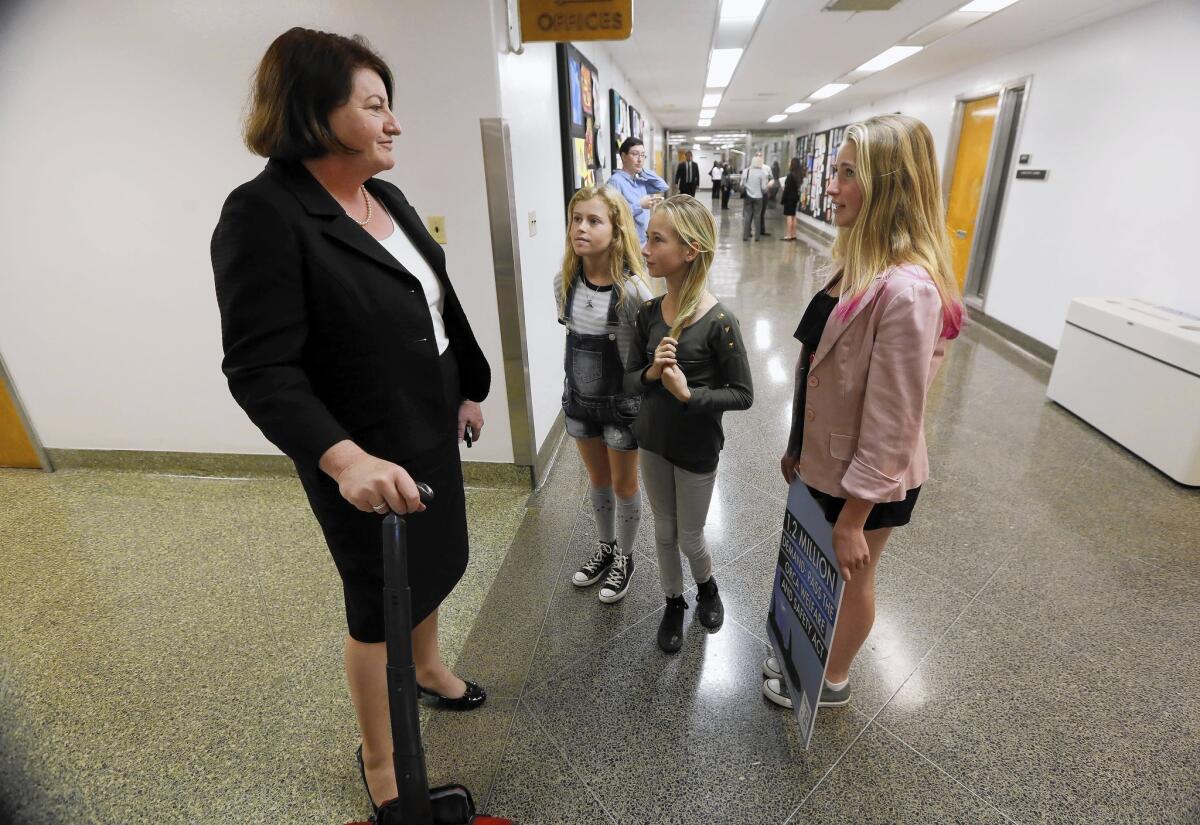Next Assembly speaker’s focus on poor is grounded in experience

- Share via
It’s rather refreshing that the next California Assembly Speaker spent her early years in a house with no indoor plumbing.
Her family carried in water from a spring for drinking, cooking and washing. For a bathroom, they trekked to an outhouse.
Assemblywoman Toni Atkins’ father was a coal and lead miner; her mother a seamstress. The parents and their four kids crammed themselves into a little four-room house in rural southern Virginia.
So when the Democrat, a San Diego transplant, talks about poor people and their housing needs, she isn’t just whistling Dixie.
Moreover, Atkins’ Appalachia roots seem to have nurtured a touch of humility mixed with an upbeat attitude, a sense of confidence that much is possible if people work hard and cooperate. She conveys a pleasant personality, a down-to-earth Americana with a slight Southern accent.
“She seems normal,” one business lobbyist told me, a description not normally used for legislators.
Of course, no one can be sure how this new leadership gig will all turn out.
Atkins, 52, currently the Assembly majority leader, will replace the termed-out Speaker John A. Pérez (D-Los Angeles) next month, about the time serious negotiations begin over a state budget.
She beat out two Los Angeles County freshmen for the job: Assemblymen Anthony Rendon (D-Lakewood) and Raul Bocanegra (D-Pacoima).
Her window of opportunity to achieve any goals will be relatively brief. She’ll be a short-timer, a victim of the old term limits law that voters loosened in 2012 by allowing new legislators to serve 12 years. But because she was elected before that, she’s limited to six years and they’re up after 2016.
Atkins will be the first San Diegan to be speaker.
She’ll also be the first lesbian.
She was the first of her family to graduate from college, a small liberal arts school in Virginia, Emory and Henry. She paid for college with grants, scholarships and loans that took 10 years to pay off.
“I came out as a lesbian in college,” she says. What were her parents’ reactions? “I don’t think my dad quite understood it, but they were embracing. You know, you support family regardless. They loved their kids.
“We grew up incredibly poor. But despite the problems of poverty, I knew my parents loved me.”
Atkins lived in the house without running water—in a mountain burg called Max Meadows—until she was 8, then moved to a tiny apartment in “the big city of Roanoke.”
She vividly remembers the early years:
“We had a wood stove that my mom cooked on. She used to put a tub of water on the stove to heat for us to take baths. We had one of those old washers with a wringer and a washboard on the front porch. And we had a rain barrel.
“We’re talking about rain barrels now in San Diego. You know, trying to make water sustainable. My staff says to me, ‘You should get a rain barrel.’ I said No. 1, honey, it doesn’t actually rain all that much in San Diego. And, 2, no way am I going back to rain barrels.”
Her family didn’t have health insurance. And her parents couldn’t afford to take off work if they did get sick. “In Virgina, there were a lot of free clinics. That’s how we had healthcare,” she says. “But I didn’t go to a dentist until I was 24 years old. And I had buck teeth.
“The good news was we didn’t eat badly. We had a garden. And a smokehouse. Dad hunted for food.”
“I just never realized how good life could be,” she says. “I just consider everything now a luxury.”
After college—and uncertain about her next step—she moved to San Diego to care for her pregnant twin sister, whose Navy husband was shipping out. “I’d always wanted to live in California,” she says
In San Diego, she used her political science degree to become a community organizer, help run a women’s health center and serve as a policy analyst for then-City Councilmember Christine Kehoe. When Kehoe was elected to the Legislature, Atkins ran for her council seat and held it for eight years until being elected to the Assembly.
A policy wonk, Atkins’ background has shaped her legislative agenda.
“Growing up the way I did with not a lot—no health insurance and certainly the housing was substandard—when you look at the things I’ve worked on,” she says, “it really is all about where I came from.”
Last year, she authored a bill signed by Gov. Jerry Brown expanding access to abortion in rural areas where there’s a shortage of doctors. It allows nurse practitioners and other non-physicians to perform first-trimester abortions.
She’s currently cosponsoring legislation that would generate roughly $500 million per year for low-income housing by imposing a $75 fee on real estate documents. But the bill appears stymied.
“Affordable housing is something I’d hoped to do here,” she says, “but it has been more difficult than I ever imagined. We really need funding.”
This year, she says, her priorities are enacting a prudent budget and a new water bond for the November ballot.
As for the massive twin water tunnels Brown wants to build under the Sacramento-San Joaquin River Delta, she says: “It’s a good discussion to have with the governor. But my community in San Diego is a little reticent about the incredible [$26 billion] expense. They think there are other alternatives.”
You get the feeling that she’ll be cooperative but not a pushover.
And based on her past, there’s every reason to believe she’ll be successful.
More to Read
Sign up for Essential California
The most important California stories and recommendations in your inbox every morning.
You may occasionally receive promotional content from the Los Angeles Times.














